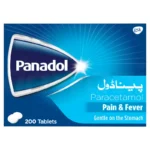Aspirin is a widely used medication belonging to the class of drugs known as nonsteroidal anti-inflammatory drugs (NSAIDs). It is one of the oldest and most commonly used drugs for pain relief, anti-inflammation, and fever reduction. Additionally, aspirin has important uses in cardiovascular health due to its antiplatelet effects, which help prevent blood clots.
Key Features of Aspirin:
- Pain Relief: Aspirin is commonly used to relieve mild to moderate pain from conditions such as headaches, toothaches, muscle aches, and menstrual cramps.
- Anti-Inflammatory: As an NSAID, aspirin reduces inflammation and can be used to manage conditions like arthritis.
- Fever Reduction: Aspirin is effective in lowering fever, making it useful for treating symptoms of the common cold or flu.
- Cardiovascular Health: Low-dose aspirin is often prescribed as a preventive measure for individuals at risk of heart attacks or strokes. It works by inhibiting platelets, which are involved in blood clot formation, thereby reducing the risk of clots that can lead to cardiovascular events.
- Mechanism of Action: Aspirin works by inhibiting the enzyme cyclooxygenase (COX), which in turn reduces the production of prostaglandins, substances in the body that cause pain, inflammation, and fever. The inhibition of COX-1 also leads to its antiplatelet effect.
- Dosage Forms: Aspirin is available in various forms, including regular tablets, chewable tablets, enteric-coated tablets (which are designed to protect the stomach lining), and effervescent formulations. It comes in different dosages, with low-dose aspirin typically around 81 mg and regular doses usually 325 mg.
- Side Effects: Common side effects of aspirin include gastrointestinal issues like stomach pain, heartburn, and nausea. In some cases, it can cause more serious side effects such as gastrointestinal bleeding or ulcers, especially with long-term use.
- Precautions: Aspirin is not recommended for use in children or teenagers with viral infections, such as flu or chickenpox, due to the risk of Reye’s syndrome, a rare but serious condition. People with certain conditions, such as peptic ulcer disease or bleeding disorders, should avoid aspirin unless directed by a doctor.
- Interactions: Aspirin can interact with other medications, such as blood thinners (e.g., warfarin), other NSAIDs, and certain supplements, so it’s important to consult a healthcare provider before starting aspirin, especially for long-term use.
Medical Considerations:
- Chronic Use: Aspirin should be used with caution in individuals with a history of gastrointestinal issues or those who require long-term therapy, as it can increase the risk of bleeding.
- Emergency Use: In some cases, aspirin can be administered during a suspected heart attack to reduce the risk of further clotting and damage to the heart.
If you have any specific questions about aspirin or need further details, feel free to ask!























































